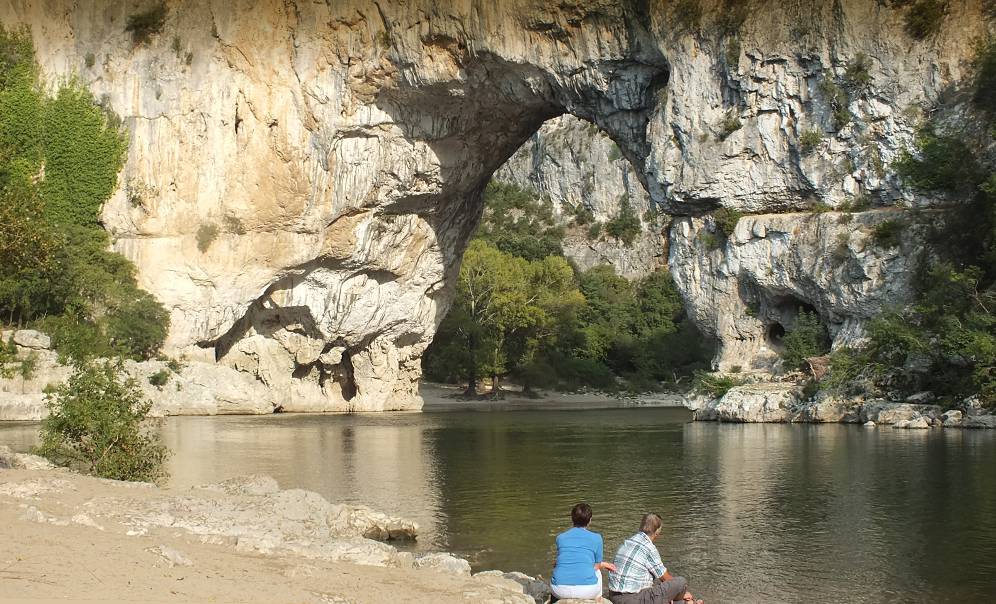
Ardèche gorge and caverns
Remarkable since prehistoric times
- Explore France ►
- Essential pages
- Travel in France
- Where to go
- What to see and do
About-France.com
- the connoisseur's guide to France
West
of the Rhone valley, and just a short distance from the main route from
Paris to the south of France, the Ardèche valley
has some of the most spectacular and interesting sites in
France.
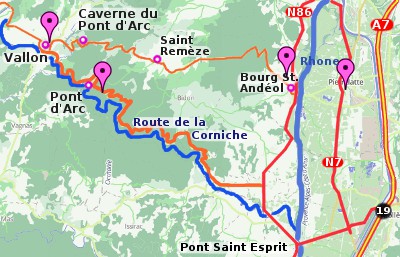 Discovering
the Ardèche gorge
Discovering
the Ardèche gorge
Access: The Ardèche gorge, between Pont Saint Esprit on the Rhone, and Vallon Pont d'Arc, is most easily accessed from Exit 19 on the main Rhone valley A7 motorway. It can also be reached via the N102 from Clermont Ferrand, via Aubenas.
 Pink markers indicate
places with hotels
Pink markers indicate
places with hotels
| On this page ► | Exploring the Ardeche gorge | The Pont d'Arc Cavern | The gorge and the corniche |
The Ardèche garrigue
The word "garrigue" designates a very dry limestone area, with an infertile rocky terrain on which the main vegetation consists of pine trees, scrub oak, vines and aromatic plants. The Ardèche garrigue has all of these, but most notably a dense cover of small evergreen oaks and deciduous oaks. Here and there the natural forest has been cleared to make way for vineyards or lavender fields.
The Ardèche gorge road trip is a journey through this varying Mediterranean landscape, with plenty of things to see, including the spectacular Pont d'Arc natural bridge over the river Ardèche, the breathtaking Caverne du Pont d'Arc, with its unique cave paintings, a Lavender museum in Saint Remèze, and marvellous views from the Route de la Corniche de l'Ardèche, with its many stopping places and viewing platforms on the lip of the gorge.
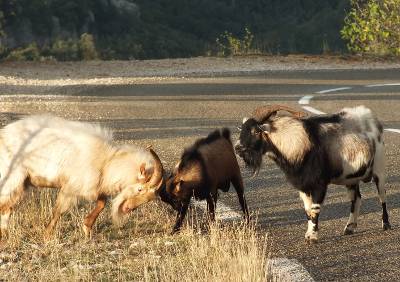
Wild goats beside the road on the Ardèche Corniche route.
Exploring the Gorges de l'Ardèche
Most visitors will approach the Ardeche gorge from the Rhone valley. If approaching from the north, leave the A7 motorway at Exit 18, Montelimar south, and follow the N7 south as far as Pierrelatte. At Pierrelatte, turn west for Bourg Saint Andéol, the start of the Ardèche circuit.Bourg Saint Andéol is a pretty and historic small town which was once a centre for the silk trade. In bygone centuries, the farmers of the Ardèche used to supplement their meagre farming income by breeding silk-worms, and to this day many an Ardèche farmhouse still has a few mulberry trees growing in the yard, a reminder of this former economic activity. The historic Palais des Evêques in Bourg Saint Andéol is a finely restored 13th - 18th century former bishop's palace with remarkable historic kitchens and some very fine painted ceilings.
Leave Bourg on the D4, following the signs for Saint Remèze and Vallon Pont d'Arc. Don't forget to stop about five kilometres out of Bourg to enjoy the fine view over the Rhone valley. This is an official stopping point and signposted as you come to it. There is a table d'orientation to show you what is what, from the peak of the Mont Ventoux to the south, past the Tricastin nuclear power station, and up to the Vercors to the northeast. You are now in typical Ardèche garrigue, with its stunted evergreen oaks and Mediterranean undergrowth.
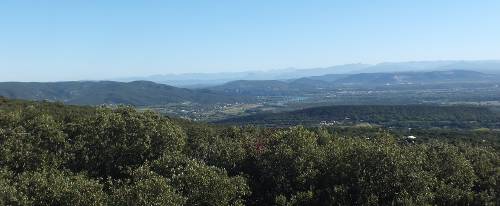
View over the Rhone valley
A kilometre before Saint Remèze, you may like to turn left onto the D201 for a visit to the Aven Marzel, one of the area's many underground caverns (open April - October inclusive). This spectacular cave has fine stalacmites and stalactites, a "dinosaur zoo" with lifesize models, and a museum of the underground world.
Another visit close to Saint Remeze is the lavender museum, 2 km southwest of the town, beside the D490; it is a small museum telling the story of lavender, and how it is farmed, harvested and made into perfume.
The Caverne du Pont d'Arc
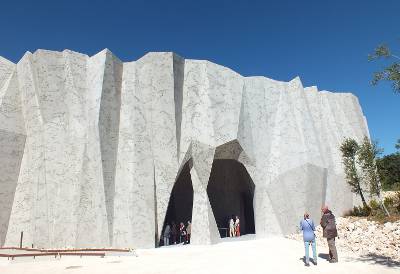
The dramatic shape of the Cavern du Pont d'Arc.
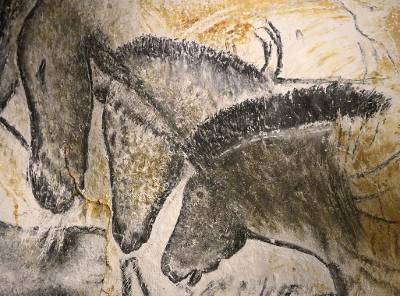
Three horses heads - exactly reproduced from the original
The Caverne du Pont d'Arc is a faithful replica of the astonishing Grotte Chauvet caves, a few kilometres away, which were discovered by pot-holers in 1994. The caves, a UNESCO World Heritage site, contain the oldest and one of the largest collections in the world of prehistoric cave paintings. Painted as far back as 36,000 years ago, they are almost 20,000 years older than the paintings at Lascaux, and in a remarkable state of conservation, due to the fact that the original mouth to the caves was blocked off by a rock fall some 20,000 years ago. The original caves are not open to the public, in order to conserve the paintings in a pristine state.
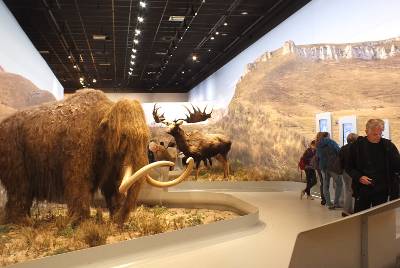
Wandering through the prehistoric museum.
Before visiting the Caverne (but after entering the site), most visitors will want to visit the prehistoric museum, which prrovides a lively and interesting insight into the life and ways of our prehistoric ancestors who lived in the Ardèche. As well as artefacts, the museum has lifesize replicas of the animals that roamed in the area in prehistoric times. Visitors wander among them as participants in reenactment of prehistoric times.
For other prehistoric sites, see Prehistoric France
Vallon, the Pont d'Arc and the Corniche
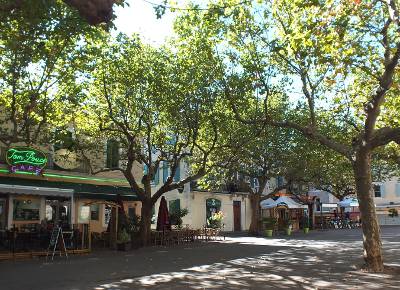
The main square of Vallon Pont d'Arc, with its cafés.
Vallon has long been the starting point for canoe and raft trips down the Ardèche gorge, and there are a number of opportunities to hire out canoes for the day or the afternoon; the canoe hire bases provide all the equipment, with a minibus service to bring you back to the base at the end of your trip. For most of the year, the Ardèche flows gently down through the gorge, and canoeing here is something that is accessible to all, beginners included.

The Pont d'Arc
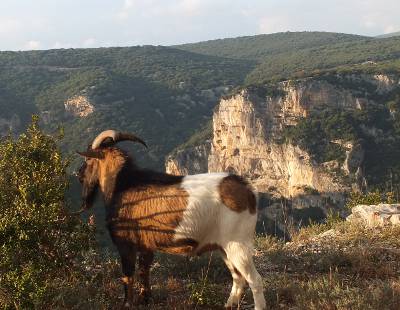
A wild goat admiring the view beside the corniche road
Eventually, the corniche route comes to an end, as the river flows out of the limestone massif, and towards the Rhone, which it joins at Pont Saint Esprit. But before leaving the garrigue, visitors also have the opportunity to take in another underground cave, the Grotte de la Madeleine (open April to October inclusive) located between the Corniche route and the gorge, a kilometre after the Belvedere de Gournier. The Grotte de la Madeleine has some of the finest stalacmites and stalactites of any cave in France, and the underground visit is an enchanting experience.
The Ardèche gorge scenic route comes to an end (or starts) at the small town of Saint Martin d'Ardèche, with its suspension bridge across the river. Located at the end of the canoeing trail that started in Vallon, Saint Martin is a small town with plenty of cafés, restaurants and campsites. From here, it is a short journey back to the starting point of the circuit at Bourg Saint Andéol, or else on to Pont Saint Esprit to rejoin the A7 motorway and on into Provence.
Places
to stay
Hotel
search
Gites
and
holiday cottages
Bed
and
breakfast in France
Rural
campsites in France
Discover more of France off the beaten track .....
- The Gorges du Verdon - The deepest gorge in France
- The Gorges du Tarn - France's other spectacular gorge
- Best French towns and cities - places larger than those on this page, the well known and the less well known..
- Beautiful villages in France places smaller than those mentioned on this page
- Walled cities in France cities and towns that are still surrounded or largely surrounded by their ancient walls.
- Wild France rural France and French hill country.
About-France.com
Home
page - Site
search
- Regions
- Maps of France
- Contact
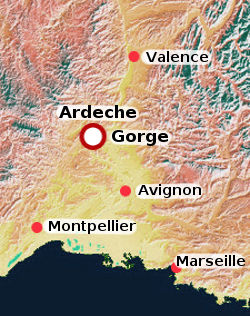
About-France.com
is an independent user-supported website
that does not track visitors and carries very little advertising, Links
to carefully selected affiliate partner websites may generate
commission on sales at no cost to the user.
 Ardèche cliffs in
the evening sun
Ardèche cliffs in
the evening sun
Copyright text and photos © About-France.com 2007 - 2025 except:
Photo of horses in Caverne de l'Ardèche by Claude Valette - licence Creative commons.
Map enhanced from an open-source original on openstreetmap.org
